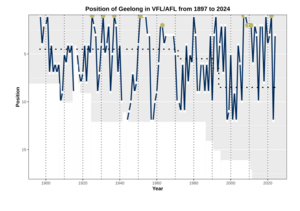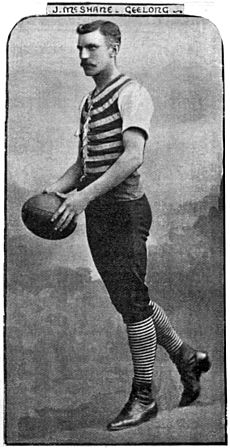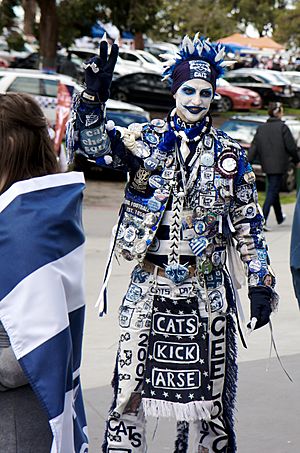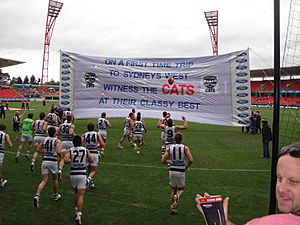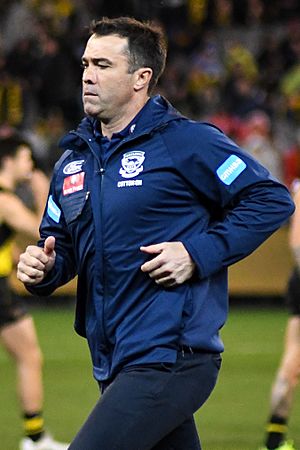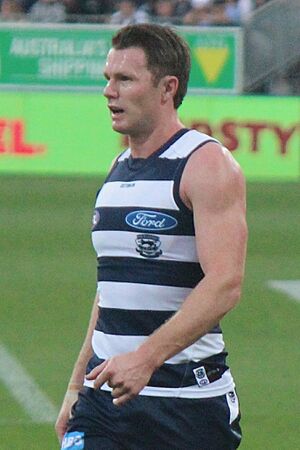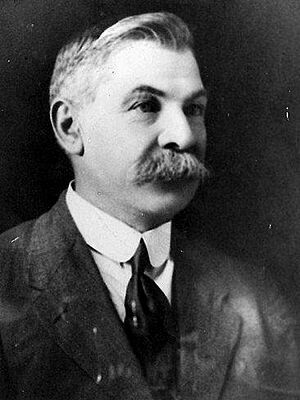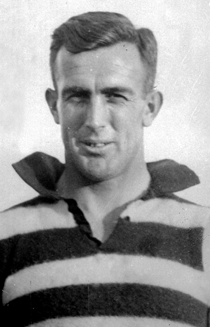Geelong Football Club facts for kids
Quick facts for kids Geelong Football Club |
|||
|---|---|---|---|
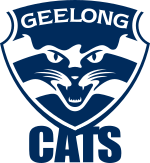 |
|||
| Names | |||
| Full name | Geelong Football Club Limited | ||
| Nickname(s) | Cats | ||
| Former nickname(s) | Pivotonians, Seagulls | ||
| 2025 season | |||
| After finals | Runners-up | ||
| Home-and-away season | 2nd | ||
| Leading goalkicker | Jeremy Cameron (88 goals) | ||
| Club details | |||
| Founded | 18 July 1859 | ||
| Colours | Navy blue, white |
||
| Competition | AFL: Senior men AFLW: Senior women (national level) VFL: Reserves men VFLW: Senior women (state level) |
||
| President | Grant McCabe | ||
| CEO | Steve Hocking | ||
| Coach | AFL: Chris Scott AFLW: Daniel Lowther VFL: Mark Corrigan VFLW: Taylah Hassett |
||
| Captain(s) | AFL: Patrick Dangerfield AFLW: Meg McDonald VFL: Dan Capiron VFLW: Mel Staunton |
||
| Premierships | VFL/AFL (10)
|
||
| Ground(s) | GMHBA Stadium (capacity: 40,000) | ||
| Melbourne Cricket Ground (capacity: 100,024) | |||
| Former ground(s) | Corio Oval (1878-1940) | ||
| Training ground(s) | Deakin University Elite Sports Precinct GMHBA Stadium |
||
| Uniforms | |||
|
|||
| Other information | |||
| Official website | www.geelongcats.com.au | ||
The Geelong Football Club, known as the Cats, is a professional Australian rules football team. They are based in Geelong, Victoria, Australia. The club plays in the Australian Football League (AFL), which is the top competition for the sport. Formed on April 13, 1859, it is the second-oldest AFL team and one of the oldest football clubs in the world.
In the early days, Geelong played in various competitions. They were a founding member of the Victorian Football Association (VFA) in 1877 and the Victorian Football League (VFL) in 1897. The VFL later became the national AFL. The club won many championships, including seven VFA premierships between 1878 and 1886. They also won six VFL premierships by 1963. After a long wait, they won another premiership in 2007 with a huge victory. Geelong continued their success, winning three more premierships in 2009, 2011, and 2022. The Cats have strong rivalries with the Hawthorn and Collingwood teams.
Geelong plays most of its home games at Kardinia Park in South Geelong. This stadium is also called GMHBA Stadium for sponsorship reasons. They also play some games at the Melbourne Cricket Ground. The team's traditional uniform colors are navy blue and white hoops. The nickname "Cats" started in 1923. A cartoonist suggested a black cat might bring them good luck after some losses. The club's official song is "We Are Geelong".
Geelong also has a men's reserve team in the Victorian Football League (VFL). They have a senior women's team in the AFL Women's (AFLW) and a women's reserve team in the VFL Women's (VFLW) competitions.
Contents
The Geelong Cats: A Rich History
The Geelong Football Club was founded in 1859 in Geelong, Australia. This makes it the second-oldest AFL club. It is also one of the oldest football clubs in the world and has been very successful. At first, the club played by its own rules. Some of these rules were even adopted into Australian Football. In the early 1860s, they started using the official Laws of Australian Football.
Geelong has almost always played in the top football competitions. They were a founding club of the Victorian Football Association (VFA) in 1877. They also helped start the Victorian Football League (VFL) in 1897. Today, they compete in the elite Australian Football League (AFL). The Cats have won the VFL/AFL premiership ten times. Four of these wins were in the modern AFL era (since 1990): in 2007, 2009, 2011, and most recently, 2022. This makes them one of the most successful clubs in that period. They have also won the McClelland Trophy eleven times, which is more than any other AFL/VFL club.
Geelong's Team Spirit and Look
Team Colors and Uniforms
Geelong's traditional navy blue and white striped uniform, called a guernsey, has been worn since the club began in the mid-1800s. People say the design represents the white seagulls and blue water of Corio Bay nearby.
Since 1998, the team has also worn different away uniforms. These always feature the club's logo and traditional colors.
Why "The Cats"?
Geelong has been known as the "Cats" since 1923. After a tough start to a season, a cartoonist suggested that a black cat might bring the club good luck. A local business person quickly started selling badges with a black cat on them at games. Soon after, Geelong won four games in a row! This made the cat a special part of the club's story forever.
Before this, Geelong was sometimes called the "Pivotonians." This name came from the city's nickname, "the Pivot." They were also called the "Seagulls" because Geelong is by the sea.
Our Team Song
Geelong's official club song is "We Are Geelong." The music comes from the "Toreador" from the opera Carmen. The words were written by a former premiership player, John Watts. For many years, only the first part was sung at games. However, since the start of the 2025 season, both parts of the song are played. The version used today was recorded by the Fable Singers in 1972. Here are the words:
- We are Geelong, the greatest team of all
- We are Geelong; we're always on the ball
- We play the game as it should be played
- At home or far away
- Our banners fly high, from dawn to dark
- Down at Kardinia Park.
- So! Stand up and fight, remember our tradition
- Stand up and fight, it's always our ambition
- Throughout the game to fight with all our might
- Because we're the mighty blue and white
- And when the ball is bounced, to the final bell
- Stand up and fight like hell!
In the 1980s and 1990s, Geelong tried other team songs. These included "C'mon the Cats!" and "Cat Attack." But fans preferred the traditional song. In 2022, the club brought back "Cat Attack" for a special "Retro Round." They have continued to play it after wins at Kardinia Park.
Where the Cats Play and Train
Geelong's main office is at its home stadium, GMHBA Stadium. This stadium is also known as Kardinia Park. The club trains here during the football season. They also train at another special facility, the Deakin University Elite Sports Precinct. This place has a large oval, similar in size to the MCG. It is often used by the club before the season starts, especially when Kardinia Park is busy with other events.
Exciting Rivalries
Geelong vs. Hawthorn
The games between Hawthorn and Geelong are always very exciting. Two Grand Finals really show this rivalry: in 1989 and 2008. In the 1989 Grand Final, Geelong played very aggressively. Hawthorn won that game, but Geelong almost caught up in the last quarter.
In the 2008 Grand Final, Geelong was expected to win easily, having lost only one game all season. But Hawthorn surprised everyone and won! After this, Geelong won their next eleven games against Hawthorn over five years. This winning streak was sometimes called the "Kennett curse". It was later shared that after the 2008 Grand Final, a Geelong player named Paul Chapman made a promise with his teammates to never lose to Hawthorn again. This streak ended in 2013. Hawthorn then won the next three premierships. Many games between these two teams have been very close and thrilling.
Geelong vs. Collingwood
Geelong and Collingwood also have a long and exciting rivalry. In 1925, Geelong won their first championship against Collingwood. In 1930, Collingwood beat Geelong in the Grand Final. But Geelong stopped Collingwood from winning three championships in a row in 1937, winning a famous Grand Final by 32 points.
These two teams played many important games in the 1950s. Geelong easily beat Collingwood in the 1952 Grand Final. In 1953, Collingwood ended Geelong's amazing 23-game winning streak. They also beat Geelong in the Grand Final that year.
Since 2007, both clubs have been top teams and have met often in finals. Geelong won a memorable preliminary final in 2007. In 2011, they met again in a Grand Final, which Geelong won by 38 points. Geelong caused Collingwood's only three losses that entire 2011 season.
Club Support and Partners
Sponsors
Geelong has a very long partnership with the Ford Motor Company. This sponsorship has lasted 100 years as of 2025! It is one of the longest active sports sponsorships in the world, starting way back in 1925.
More recently, a company from Geelong called Cotton On Group has also become a big partner. They have made the team's uniforms and other merchandise since 2016.
AFL Sponsors
| Year | Kit Manufacturer | Major Sponsor | Shorts Sponsor | Bottom Back Sponsor | Top Back Sponsor |
|---|---|---|---|---|---|
| 1925–1992 | — | Ford | — | — | — |
| 1993 | — | Ford | — | ||
| 1994–1996 | — | Ford | |||
| 1997–1998 | Adidas | ||||
| 1999–2002 | Fila | ||||
| 2003–2006 | Slazenger | ||||
| 2007 | nib | ||||
| 2008–2016 | ISC | ||||
| 2017–2021 | Cotton On | GMHBA | |||
| 2022–2023 | Ford | ||||
| 2024–present | Simonds |
AFL Women's Sponsors
| Year | Kit Manufacturer | Major Sponsor | Shorts Sponsor | Bottom Back Sponsor | Top Back Sponsor |
|---|---|---|---|---|---|
| 2019-21 | Cotton On | Ford | Viva Energy | Deakin University | — |
| 2022 (S6) | Geelong Dairy | ||||
| 2022 (S7)–2023 | Bulla Dairy Foods | ||||
| 2024–present | Viva Energy |
Our Amazing Supporters
The Geelong Football Club has a large and dedicated group of supporters. They show their love for the team by becoming members and attending games. The table below shows how many members the club has had and the average number of people who came to home games each year.
| Season | Members | Average home attendance |
Ref |
|---|---|---|---|
| 1984 | 7,709 | 20,577 | |
| 1985 | 7,718 | 19,463 | |
| 1986 | 6,985 | 15,319 | |
| 1987 | 6,981 | 20,462 | |
| 1988 | 9,667 | 20,790 | |
| 1989 | 7,760 | 29,296 | |
| 1990 | 15,087 | 24,711 | |
| 1991 | 11,356 | 23,525 | |
| 1992 | 13,535 | 27,698 | |
| 1993 | 15,500 | 26,920 | |
| 1994 | 14,312 | 26,461 | |
| 1995 | 15,922 | 25,317 | |
| 1996 | 17,346 | 25,161 | |
| 1997 | 18,858 | 28,324 | |
| 1998 | 19,971 | 28,371 | |
| 1999 | 21,032 | 24,840 | |
| 2000 | 25,595 | 27,729 | |
| 2001 | 25,420 | 27,093 | |
| 2002 | 23,756 | 27,040 | |
| 2003 | 24,017 | 25,971 | |
| 2004 | 25,021 | 25,747 | |
| 2005 | 30,821 | 27,783 | |
| 2006 | 32,290 | 27,428 | |
| 2007 | 30,169 | 31,547 | |
| 2008 | 36,850 | 29,474 | |
| 2009 | 37,160 | 30,069 | |
| 2010 | 40,326 | 39,129 | |
| 2011 | 39,343 | 35,401 | |
| 2012 | 40,200 | 31,508 | |
| 2013 | 42,884 | 36,650 | |
| 2014 | 43,803 | 33,915 | |
| 2015 | 44,312 | 29,582 | |
| 2016 | 50,571 | 30,497 | |
| 2017 | 54,854 | 35,111 | |
| 2018 | 63,818 | 34,207 | |
| 2019 | 65,063 | 33,405 | |
| 2020 | 60,066 | 4,569 | |
| 2021 | 70,293 | 14,262 | |
| 2022 | 71,943 | 26,875 | |
| 2023 | 82,155 | 31,271 | |
| 2024 | 90,798 | 38,861 | |
| 2025 | 92,379 | 35,439 |
Players and Staff
Current Playing List and Coaches
Club Leaders
- President: Craig Drummond
- Vice President: Diana Taylor
- Chief Executive Officer: Steve Hocking
- General Manager – Football: Simon Lloyd
Club Records and Achievements
Championships and Awards
Geelong has won many championships and awards throughout its history. Here are some of their major achievements:
| Premierships | |||
| Competition | Level | Wins | Years Won |
|---|---|---|---|
| Australian Football League | Seniors | 10 | 1925, 1931, 1937, 1951, 1952, 1963, 2007, 2009, 2011, 2022 |
| Reserves (1919–1999) | 13 | 1923, 1924, 1930, 1937, 1938, 1948, 1960, 1963, 1964, 1975, 1980, 1981, 1982 | |
| Under-19s (1946–1991) | 1 | 1962 | |
| Victorian Football League | Seniors (1877–1896) | 7 | 1878, 1879, 1880, 1882, 1883, 1884, 1886 |
| Reserves (2000–present) | 3 | 2002, 2007, 2012 | |
| Other titles and honours | |||
| McClelland Trophy | Seniors | 11 | 1952, 1954, 1962, 1963, 1980, 1981, 1992, 2007, 2008, 2019, 2022 |
| Challenge Cup | Seniors | 1 | 1863–64 |
| VFL Night Series | Seniors | 1 | 1961 |
| AFL pre-season competition | Seniors | 2 | 2006, 2009 |
| Finishing positions | |||
| Australian Football League | Minor premiership | 15 | 1897, 1901, 1925, 1931, 1937, 1951, 1952, 1953, 1954, 1980, 1992, 2007, 2008, 2019, 2022 |
| Grand Finalist | 10 | 1930, 1953, 1967, 1989, 1992, 1994, 1995, 2008, 2020, 2025 | |
| Wooden spoons | 5 | 1908, 1915, 1944, 1957, 1958 | |
| Victorian Football League (Since 2000) |
Minor premiership | 2 | 2002, 2013 |
| Grand Finalist | 2 | 2006, 2013 | |
| Wooden spoon | 1 | 2005 | |
| VFL Women's | Grand Finalist | 2 | 2018, 2021 |
| Wooden spoon | 1 | 2024 | |
Win-Loss Records Against Other Clubs
This table shows how Geelong has performed against other VFL/AFL clubs over time. It lists the total games played (T), wins (W), losses (L), draws (D), and their winning percentage (Win%).
| Club | T | W | L | D | Win% |
|---|---|---|---|---|---|
| Adelaide | 52 | 31 | 21 | 0 | 59.6 |
| Brisbane Bears | 15 | 10 | 4 | 1 | 70.0 |
| Brisbane Lions | 45 | 25 | 20 | 0 | 55.6 |
| Carlton | 227 | 104 | 121 | 2 | 46.3 |
| Collingwood | 243 | 106 | 136 | 1 | 43.8 |
| Essendon | 226 | 106 | 115 | 5 | 48.0 |
| Fitzroy | 183 | 103 | 79 | 1 | 56.6 |
| Fremantle | 46 | 30 | 16 | 0 | 65.2 |
| Gold Coast | 17 | 13 | 4 | 0 | 76.5 |
| Greater Western Sydney | 18 | 9 | 8 | 1 | 52.8 |
| Hawthorn | 173 | 96 | 76 | 1 | 55.8 |
| Melbourne | 226 | 135 | 89 | 2 | 60.2 |
| North Melbourne | 173 | 109 | 63 | 1 | 63.3 |
| Port Adelaide | 45 | 30 | 14 | 1 | 67.8 |
| Richmond | 205 | 110 | 92 | 3 | 54.4 |
| St Kilda | 225 | 136 | 88 | 1 | 60.7 |
| Sydney | 233 | 128 | 104 | 1 | 55.2 |
| University | 14 | 8 | 6 | 0 | 57.1 |
| West Coast | 60 | 32 | 27 | 1 | 54.2 |
| Western Bulldogs | 170 | 109 | 59 | 2 | 64.7 |
| Totals | 2596 | 1430 | 1142 | 24 | 55.5 |
| Key | |||||||
|---|---|---|---|---|---|---|---|
| W | Wins | L | Losses | D | Draws | T | Total |
| Win% | Winning percentage | ||||||
Memorable Match Records
Here are some of Geelong's most notable records from VFL/AFL matches:
| Club record | Round | Venue | Opponent | Details | Ref |
|---|---|---|---|---|---|
| Highest score | Round 7, 1992 | Carrara | Brisbane Bears | Geelong 37.17 (239) v Brisbane Bears 11.9 (75) | |
| Lowest score | Round 3, 1899 | Corio Oval | Fitzroy | Geelong 0.8 (8) v Fitzroy 4.8 (32) | |
| Highest losing score | Round 6, 1989 | Princes Park | Hawthorn | Geelong 25.13 (163) v Hawthorn 26.15 (171) | |
| Lowest winning score | Round 9, 1897 | Corio Oval | Melbourne | Geelong 1.9 (15) v Melbourne 0.10 (10) | |
| Biggest winning margin | Round 19, 2011 | Kardinia Park | Melbourne | 186 points Geelong 37.11 (233) v Melbourne 7.5 (47) | |
| Biggest losing margin | Round 21, 1986 | Princes Park | Hawthorn | 135 points – Geelong 13.12 (90) v Hawthorn 35.15 (225) | |
| Record attendance (home and away game) | Round 6, 2025 | Melbourne Cricket Ground | Hawthorn | 88,746 | |
| Record attendance (finals matches, excluding Grand Finals) | 1968 VFL season preliminary final | Melbourne Cricket Ground | Essendon | 103,649 | |
| Record attendance (finals match) | 1967 VFL Grand Final | Melbourne Cricket Ground | Richmond | 109,396 |
Team of the Century
Geelong's Reserves Team
The Geelong reserves team is also known as the Bendigo Bank Cats due to sponsorship. This team plays in the Victorian Football League (VFL).
Reserves Team History
Geelong's reserves team started playing in the Victorian Junior Football League in 1922. This league later became known as the VFL/AFL reserves. The team won thirteen championships during that time, which is more than any other club.
After the AFL reserves competition ended, the Geelong reserves continued to play in the Victorian Football League. Unlike most other Victorian AFL clubs, Geelong has always had its own stand-alone reserves team. This team includes reserve players from the main AFL team and other players who only play in VFL matches. Home games are played at GMHBA Stadium. Some of these games are played before the senior AFL matches.
Reserves Team Honours
- Premierships (3): 2002, 2007, 2012
- Runners-ups (2): 2006, 2013
- Minor premierships (2): 2002, 2013
- Wooden spoons (1): 2005
Geelong's Women's Teams
In 2017, after the first AFL Women's (AFLW) season, Geelong was one of eight clubs that wanted to join the competition. In September 2017, the club was chosen to have a team in the AFLW starting in 2019. The club has also had a team in the VFL Women's league, which is a second-tier competition, since 2017.
The AFL Women's team has reached the finals three times. In the 2023 season, they made it to the preliminary final before losing to the eventual champions.
AFL Women's Team Squad
Women's Match Records
Here are some of the Geelong AFLW team's most notable match records:
| Club record | Round | Venue | Opponent | Details | Ref |
|---|---|---|---|---|---|
| Highest score | Round 10, 2022 (S7) | Kardinia Park | Sydney | Geelong 15.12 (102) v Sydney 4.3 (27) | |
| Lowest score | Week 3, 2024 | Princes Park | Carlton | Geelong 0.5 (5) v Carlton 4.5 (29) | |
| Highest losing score | Week 5, 2024 | Kardinia Park | Hawthorn | Geelong 9.7 (61) v Hawthorn 12.7 (79) | |
| Lowest winning score | Round 1, 2022 (S7) | Kardinia Park | Richmond | Geelong 2.3 (15) v Richmond 1.5 (11) | |
| Biggest winning margin | Round 10, 2022 (S7) | Kardinia Park | Sydney | 75 points – Geelong 15.12 (102) v Sydney 4.3 (27) | |
| Biggest losing margin | Preliminary final, 2019 | Adelaide Oval | Adelaide | 66 points – Geelong 1.1 (7) v Adelaide 11.7 (73) | |
| Record attendance (home and away game) | Round 1, 2019 | Kardinia Park | Collingwood | 18,429 | |
| Record attendance (finals matches, excluding Grand Finals) | Preliminary final, 2019 | Adelaide Oval | Adelaide | 13,429 | |
| Record attendance (finals match) | Preliminary final, 2019 | Adelaide Oval | Adelaide | 13,429 |
Community Involvement
Supporting Equal Rights
The Geelong Football Club has shown its support for equal rights for all people.
Supporting Indigenous Voices
The club also supported efforts to give Indigenous Australians a stronger voice in decisions affecting them.
See also
 In Spanish: Geelong Football Club para niños
In Spanish: Geelong Football Club para niños
- Sport in Australia
- Sport in Victoria
- List of Geelong Football Club players, captains and coaches
- 1963 Miracle Match
 | Janet Taylor Pickett |
 | Synthia Saint James |
 | Howardena Pindell |
 | Faith Ringgold |


